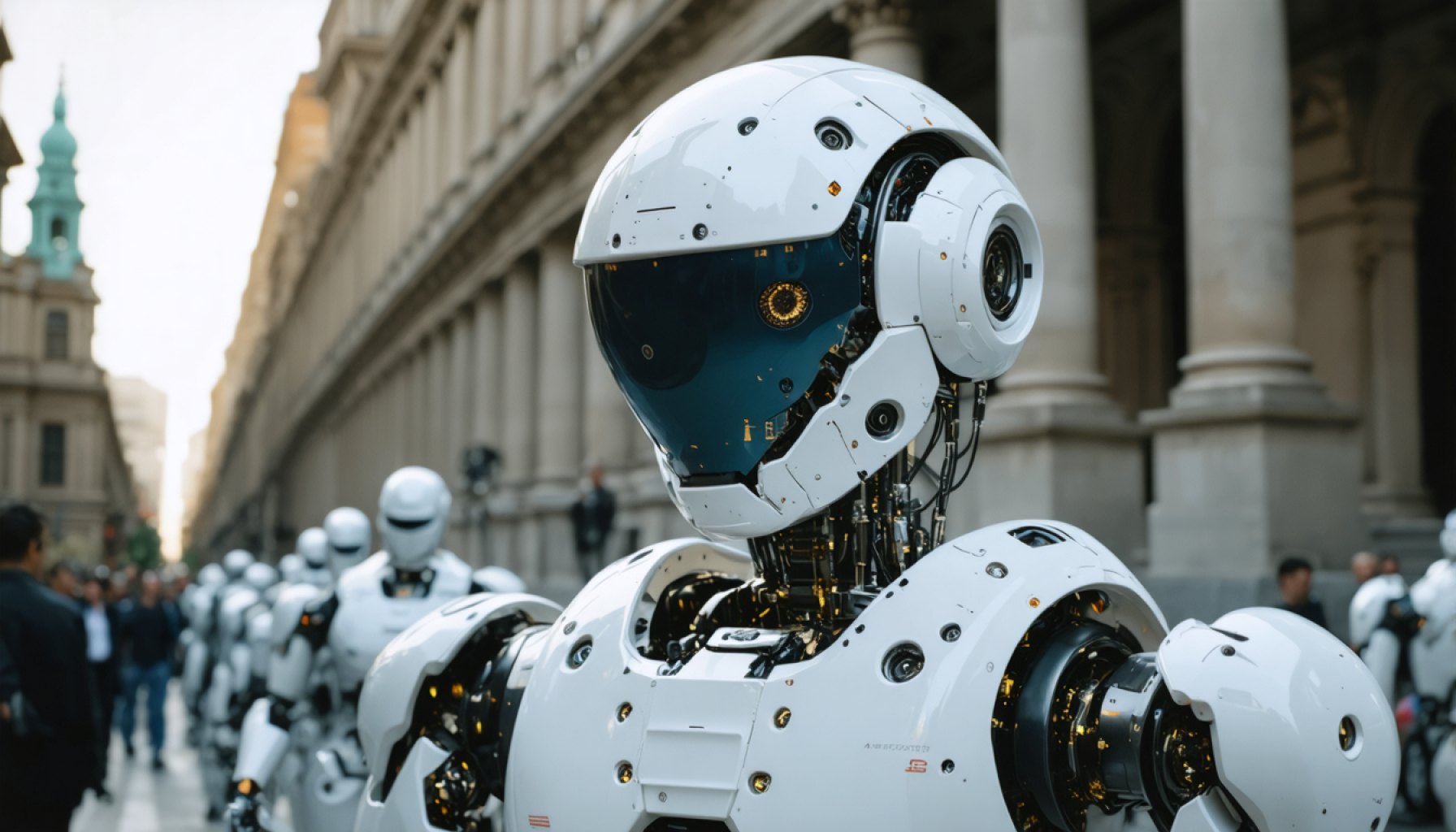
This image was generated using artificial intelligence. It does not depict a real situation and is not official material from any brand or person. If you feel that a photo is inappropriate and we should change it please contact us.
Are Robots Remaking NAFTA? How AI is Transforming Mexico-Canada Relations
- AI is transforming Mexico and Canada’s economic collaboration under NAFTA.
- Smart manufacturing solutions in Mexico and Canada capitalize on AI for improved production and logistics.
- The agricultural and energy sectors benefit from AI, enhancing crop yields and addressing food security.
- Both countries are committed to developing ethical AI standards through collaborative research.
- The AI-driven synergy fosters a new era of economic co-dependence and sustainable growth.
- AI’s integration exemplifies technology’s role in shaping future cross-border relations.
Mexico and Canada, two key partners under the North American Free Trade Agreement (NAFTA) framework, are experiencing a profound transformation. The driving force? Artificial Intelligence (AI). Both nations are increasingly harnessing AI technologies, reshaping bilateral economic collaborations in innovative ways.
As AI systems become integral to supply chains, Mexico and Canada are leading the way with smart manufacturing solutions. Mexico, with its rapidly growing tech hubs, is utilizing AI to enhance automotive and electronics production efficiency. Meanwhile, Canadian firms are spearheading breakthroughs in AI-driven logistics and supply chain optimization.
Beyond manufacturing, AI is also redefining sectors like agriculture and energy. Mexico’s rich agricultural landscapes and Canada’s technological prowess have inspired joint ventures in AI-powered farming. This collaboration is not only boosting crop yields but also addressing food security concerns pertinent to both nations.
Moreover, the two countries are increasing their cooperation to advance AI research and ethical standards. Institutions in Canada and Mexico are forging partnerships to study and implement responsible AI usage, ensuring that technological progress aligns with ethical considerations.
Looking ahead, this AI-induced synergy may give rise to a new era of economic co-dependence between Mexico and Canada. The shared pursuit of technological advancements promises not only to bolster economic ties but also to pioneer sustainable, AI-driven growth models applicable beyond NAFTA.
This dynamic relationship underscores the potential for technology to shape the future of cross-border relations, with AI paving the way for enhanced collaboration and mutual prosperity.
AI Revolution: How Mexico and Canada are Shaping a New Era of Economic Synergy
1. How are Mexico and Canada leveraging AI in their manufacturing sectors?
Mexico and Canada are at the forefront of utilizing AI in manufacturing, revolutionizing traditional production methods. In Mexico, AI is significantly enhancing efficiency in the automotive and electronics industries. Tech hubs in cities like Guadalajara are rapidly innovating, integrating AI solutions that streamline production processes and reduce costs.
On the other hand, Canadian firms are exploring AI-driven logistics, optimizing supply chains to improve performance and reduce environmental impact. The combination of these technologies fosters seamless cross-border supply chain operations between the two countries.
For more insights on technological advancements, check out World Economic Forum.
2. What are the sustainable impacts of AI-driven agricultural collaborations between these countries?
AI innovations are redefining agriculture, and Mexico and Canada are leveraging this transformation to create sustainable farming models. By integrating AI-powered tools, Mexican farms are becoming more efficient, increasing crop yields while decreasing resource wastage.
Canadian technologies play a crucial role, providing advanced AI systems to monitor soil health, weather patterns, and crop growth, ensuring optimal agricultural productivity. This collaboration not only boosts food security but also sets a precedent for sustainable agricultural practices that can be adopted globally.
Further exploration in sustainable practices can be found at United Nations.
3. What steps are being taken by Mexico and Canada to ensure ethical AI deployment?
Ensuring ethical AI deployment is a priority for both Mexico and Canada as they ramp up their technological engagements. Canadian and Mexican academic and research institutions are forming dedicated partnerships aimed at studying and implementing responsible AI usage. These initiatives focus on developing frameworks that align AI innovation with ethical standards, safeguarding against potential misuse of AI technologies.
Collaborative efforts include hosting joint conferences, workshops, and shared publications to foster a culture of ethical AI research and deployment. This proactive approach guarantees that the rapid technological advancements are managed responsibly and with due diligence.
For more information on ethical AI practices, visit Oxford University.
Conclusion
As Mexico and Canada continue this AI-driven journey, their partnership exemplifies how technology can redefine economic relationships. By fostering innovation, these countries are building a future where AI not only bolsters economic ties but also promotes sustainability and ethical advancement. This evolving landscape suggests a model of cooperation that other nations might follow to blend technology with international collaboration effectively.
Comments (0)